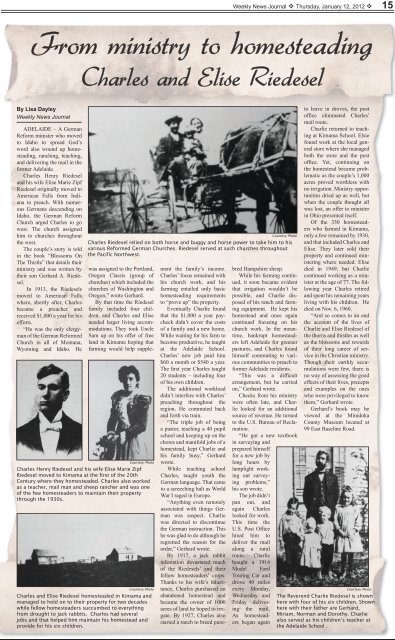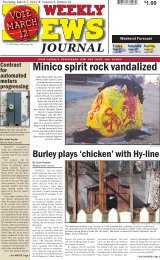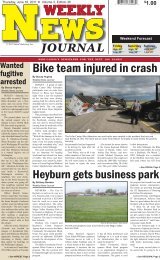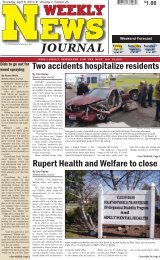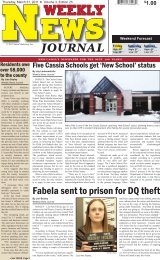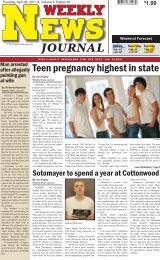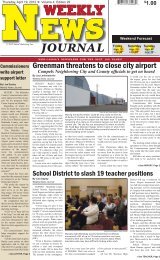You also want an ePaper? Increase the reach of your titles
YUMPU automatically turns print PDFs into web optimized ePapers that Google loves.
ADELAIDE – A German<br />
Reform minister who moved<br />
to Idaho to spread God’s<br />
word also wound up homesteading,<br />
ranching, teaching,<br />
and delivering the mail in the<br />
former Adelaide.<br />
Charles Henry Riedesel<br />
and his wife Elise Marie Zipf<br />
Riedesel originally moved to<br />
American Falls from Indiana<br />
to preach. With numerous<br />
Germans descending on<br />
Idaho, the German Reform<br />
Church urged Charles to go<br />
west. The church assigned<br />
him to churches throughout<br />
the west.<br />
The couple’s story is told<br />
in the book “Blossoms On<br />
The Thistle” that details their<br />
ministry and was written by<br />
their son Gerhard A. Riedesel.<br />
In 1913, the Riedesels<br />
moved to American Falls<br />
where, shortly after, Charles<br />
became a preacher and<br />
received $1,000 a year for his<br />
efforts.<br />
“He was the only clergyman<br />
of the German Reformed<br />
Church in all of Montana,<br />
Wyoming and Idaho. He<br />
was assigned to the Portland,<br />
Oregon Classis (group of<br />
churches) which included the<br />
churches of Washington and<br />
Oregon,” wrote Gerhard.<br />
By that time the Riedesel<br />
family included four children,<br />
and Charles and Elise<br />
needed larger living accommodations.<br />
They took Uncle<br />
Sam up on his offer of free<br />
land in Kimama hoping that<br />
farming would help supple-<br />
ment the family’s income.<br />
Charles’ focus remained with<br />
his church work, and his<br />
farming entailed only basic<br />
homesteading requirements<br />
to “prove up” the property.<br />
Eventually Charlie found<br />
that the $1,000 a year paycheck<br />
didn’t cover the costs<br />
of a family and a new home.<br />
While waiting for his farm to<br />
become productive, he taught<br />
at the Adelaide School.<br />
Charles’ new job paid him<br />
$60 a month or $540 a year.<br />
The fi rst year Charles taught<br />
20 students – including four<br />
of his own children.<br />
The additional workload<br />
didn’t interfere with Charles’<br />
preaching throughout the<br />
region. He commuted back<br />
and forth via train.<br />
“The triple job of being<br />
a pastor, teaching a 40 pupil<br />
school and keeping up on the<br />
chores and manifold jobs of a<br />
homestead, kept Charlie and<br />
his family busy,” Gerhard<br />
wrote.<br />
While teaching school<br />
Charles, taught youth the<br />
German language. That came<br />
to a screeching halt as World<br />
War I raged in Europe.<br />
“Anything even remotely<br />
associated with things German<br />
was suspect. Charlie<br />
was directed to discontinue<br />
the German instruction. This<br />
he was glad to do although he<br />
regretted the reason for the<br />
order,” Gerhard wrote.<br />
By 1917, a jack rabbit<br />
infestation devastated much<br />
of the Riedesels’ and their<br />
fellow homesteaders’ crops.<br />
Thanks to his wife’s inheritance,<br />
Charles purchased an<br />
abandoned homestead and<br />
became the owner of 1000<br />
acres of land he hoped to irrigate.<br />
By 1927, Charles also<br />
started a ranch to breed pure-<br />
Weekly <strong>News</strong> <strong>Journal</strong> Thursday, January 12, 2012 15<br />
From ministry to homesteading<br />
By Lisa Dayley<br />
Weekly <strong>News</strong> <strong>Journal</strong><br />
Charles and Elise Riedesel<br />
bred Hampshire sheep.<br />
While his farming continued,<br />
it soon became evident<br />
that irrigation wouldn’t be<br />
possible, and Charlie disposed<br />
of his ranch and farming<br />
equipment. He kept his<br />
homestead and once again<br />
continued focusing on his<br />
church work. In the meantime,<br />
bankrupt homesteaders<br />
left Adelaide for greener<br />
pastures, and Charles found<br />
himself commuting to various<br />
communities to preach to<br />
former Adelaide residents.<br />
“This was a diffi cult<br />
arrangement, but he carried<br />
on,” Gerhard wrote.<br />
Checks from his ministry<br />
were often late, and Charlie<br />
looked for an additional<br />
source of revenue. He turned<br />
to the U.S. Bureau of Reclamation.<br />
“He got a new textbook<br />
in surveying and<br />
prepared himself<br />
for a new job by<br />
long hours by<br />
lamplight working<br />
out surveying<br />
problems,”<br />
his son wrote.<br />
The job didn’t<br />
pan out, and<br />
again Charles<br />
looked for work.<br />
This time the<br />
U.S. Post Offi ce<br />
hired him to<br />
deliver the mail<br />
along a rural<br />
route. Charlie<br />
bought a 1914<br />
Model Ford<br />
Touring Car and<br />
drove 40 miles<br />
every Monday,<br />
Wednesday and<br />
Friday delivering<br />
the mail.<br />
As homesteaders<br />
began again<br />
Courtesy Photo<br />
Charles Riedesel relied on both horse and buggy and horse power to take him to his<br />
various Reformed German Churches. Riedesel served at such churches throughout<br />
the Pacific Northwest.<br />
Courtesy Photo<br />
Charles Henry Riedesel and his wife Elise Marie Zipf<br />
Riedesel moved to Kimama at the first of the 20th<br />
Century where they homesteaded. Charles also worked<br />
as a teacher, mail man and sheep rancher and was one<br />
of the few homesteaders to maintain their property<br />
through the 1930s.<br />
Courtesy Photo<br />
Charles and Elise Riedesel homesteaded in Kimama and<br />
managed to hold on to their property for two decades<br />
while fellow homesteaders succumbed to everything<br />
from drought to jack rabbits. Charles had several<br />
jobs and that helped him maintain his homestead and<br />
provide for his six children.<br />
to leave in droves, the post<br />
offi ce eliminated Charles’<br />
mail route.<br />
Charlie returned to teaching<br />
at Kimama School. Elsie<br />
found work at the local general<br />
store where she managed<br />
both the store and the post<br />
offi ce. Yet, continuing on<br />
the homestead became problematic<br />
as the couple’s 1,000<br />
acres proved worthless with<br />
no irrigation. Ministry opportunities<br />
dried up as well, but<br />
when the couple thought all<br />
was lost, an offer to minister<br />
in Ohio presented itself.<br />
Of the 330 homesteaders<br />
who farmed in Kimama,<br />
only a few remained by 1930,<br />
and that included Charles and<br />
Elise. They later sold their<br />
property and continued ministering<br />
where needed. Elise<br />
died in 1949, but Charlie<br />
continued working as a minister<br />
at the age of 77. The following<br />
year Charles retired<br />
and spent his remaining years<br />
living with his children. He<br />
died on Nov. 6, 1960.<br />
“And so comes to an end<br />
the account of the lives of<br />
Charlie and Elise Riedesel of<br />
the thorns and thistles as well<br />
as the blossoms and rewards<br />
of their long career of service<br />
in the Christian ministry.<br />
Though their earthly accumulations<br />
were few, there is<br />
no way of assessing the good<br />
effects of their lives, precepts<br />
and examples on the ones<br />
who were privileged to know<br />
them,” Gerhard wrote.<br />
Gerhard’s book may be<br />
viewed at the Minidoka<br />
County Museum located at<br />
99 East Baseline Road.<br />
Courtesy Photo<br />
The Reverend Charlie Riedesel is shown<br />
here with four of his six children. Shown<br />
here with their father are Gerhard,<br />
Miriam, Norman and Dorothy. Charlie<br />
also served as his children’s teacher at<br />
the Adelaide School .


